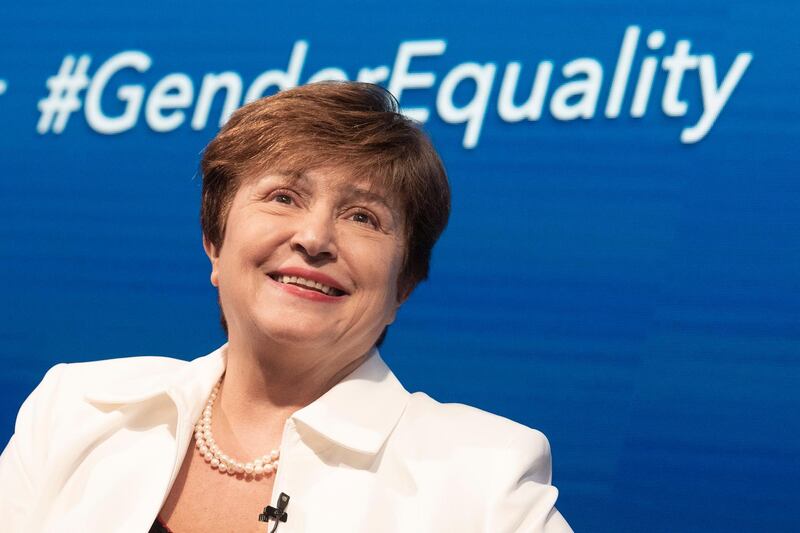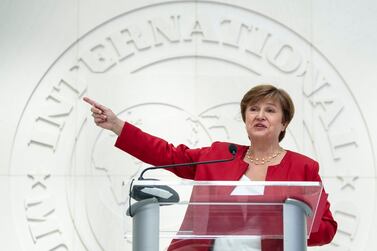Empowering women promotes growth and their inclusion in the workforce boosts economic resilience and productivity, according to Kristalina Georgieva, the International Monetary Fund’s new managing director.
“There is no way for any society to prosper without tapping into the talent of all its people — men and women. It’s very simple if you ignore part of your capabilities, you’ll come short in terms of your economic achievements,” Ms Georgieva, 66, who was appointed to head the Washington-lender at the start of this month, told participants attending a talk on women, work, and leadership.
About 1.7 billion women are restricted in what jobs they can do in comparison to men because of legal obstacles in different countries, according to IMF research. Their unrestricted inclusion in the workforce can make economies more resilient and countries more prosperous, said Ms Georgieva, who is the second woman to lead the IMF since its inception in 1944, and the first person from an emerging-market economy.
Sweden’s economic output, or gross domestic product, would be 4 per cent higher if women fully participated in the economy on equal terms as men, she said, citing IMF research. Senegal’s GDP would be 8 per cent higher. Companies are also more profitable when they have more women on their boards or in management. Profitability of companies that have pursued a policy of inclusion of women at high executive levels is between 8 and 11 per cent better, according to the fund.
“Diverse teams contribute to better decisions,” said Ms Georgieva. “Women tend to be more oriented to the bigger public good rather than the individual achievement. Women also tend to be, on balance, less corrupt”.
Ms Georgieva, who previously was the chief executive of the World Bank and served also as its interim president, said she would favour quotas for women on the boards of companies, which would increase gender equality.
“I think if you don’t have them it would take us a very long time to get to where we want,” she said. At a senior level in the IMF, women occupy 25 per cent of the roles.
On average, women work an average 2.7 hours more without pay per day than men - a figure which differs between countries. Women in Norway perform 20 per cent more unpaid work, in the US 60 per cent more, in Japan 380 per cent, and in Pakistan as much as 1,000 per cent. If unpaid work, such as household chores and taking care of children, was accounted for statistically, the world’s GDP would increase by 35 to 40 per cent, according to IMF research.
“Universally it means there is unfair distribution,” said Ms Georgieva. “The bigger issue is it is inefficient because you will get very highly skilled women doing very low skilled work.”
Gender equality necessitates equal pay for women doing the same jobs as men and financial inclusion empowers women, the fund's director said.
“What we are talking is about is a societal transformation that in my humble opinion is irreversible, we are moving towards gender equality,” Ms Georgieva said.
A native of Bulgaria and initially an environmental economist, Ms Georgieva said she worked twice as hard as her male colleagues throughout her career in her quest for recognition and advancement.
“As a professor I would take more classes, I would take the classes of my male colleagues because they were going on vacation. I never complained,” she said, adding “guess what, by working more and working harder I kind of got better than them, and here I am running the IMF.”
Though change is happening, men and women are still not on an equal footing. In advanced economies men earn about 16 per cent more than women.
“I actually for quite some time did not believe in advocacy for gender equality,” said Ms Georgieva. “I thought we had to be gender blind, you’re either good or not, until I realised taking this attitude would keep women behind, because we’re not yet at the point when we can be gender blind and see men and women apply for the same positions and get equal treatment.”
It was when she was on a trip to Vietnam, leading a World bank delegation and a female interpreter approached her asking Ms Georgieva to thank the World Bank president for sending a woman to the Asian country to set an example for Vietnamese men that prompted the fund director to advocate for gender equality.
“That was the moment I realised not in one single meeting had I met one woman,” she said.
In closing Ms Georgieva paid tribute to Christine Lagarde, the former IMF director who is now heading the European Central Bank.
“She broke this glass ceiling, it was easier for me to come through, no cuts.”









